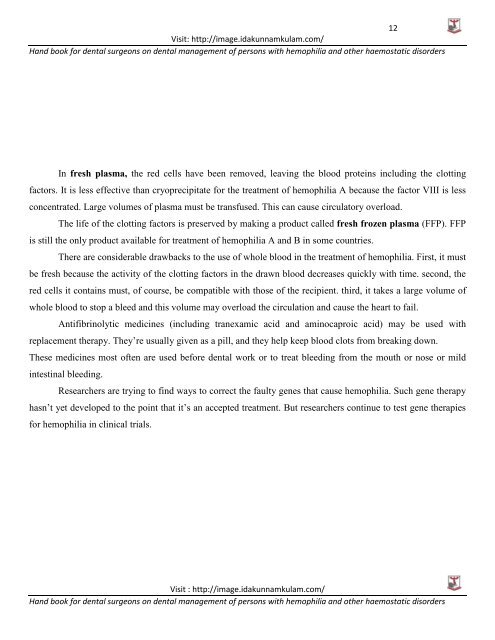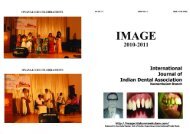hand book for dental surgeons - Indian Dental Association ...
hand book for dental surgeons - Indian Dental Association ...
hand book for dental surgeons - Indian Dental Association ...
You also want an ePaper? Increase the reach of your titles
YUMPU automatically turns print PDFs into web optimized ePapers that Google loves.
12<br />
Visit: http://image.idakunnamkulam.com/<br />
Hand <strong>book</strong> <strong>for</strong> <strong>dental</strong> <strong>surgeons</strong> on <strong>dental</strong> management of persons with hemophilia and other haemostatic disorders<br />
In fresh plasma, the red cells have been removed, leaving the blood proteins including the clotting<br />
factors. It is less effective than cryoprecipitate <strong>for</strong> the treatment of hemophilia A because the factor VIII is less<br />
concentrated. Large volumes of plasma must be transfused. This can cause circulatory overload.<br />
The life of the clotting factors is preserved by making a product called fresh frozen plasma (FFP). FFP<br />
is still the only product available <strong>for</strong> treatment of hemophilia A and B in some countries.<br />
There are considerable drawbacks to the use of whole blood in the treatment of hemophilia. First, it must<br />
be fresh because the activity of the clotting factors in the drawn blood decreases quickly with time. second, the<br />
red cells it contains must, of course, be compatible with those of the recipient. third, it takes a large volume of<br />
whole blood to stop a bleed and this volume may overload the circulation and cause the heart to fail.<br />
Antifibrinolytic medicines (including tranexamic acid and aminocaproic acid) may be used with<br />
replacement therapy. Theyíre usually given as a pill, and they help keep blood clots from breaking down.<br />
These medicines most often are used be<strong>for</strong>e <strong>dental</strong> work or to treat bleeding from the mouth or nose or mild<br />
intestinal bleeding.<br />
Researchers are trying to find ways to correct the faulty genes that cause hemophilia. Such gene therapy<br />
hasnít yet developed to the point that itís an accepted treatment. But researchers continue to test gene therapies<br />
<strong>for</strong> hemophilia in clinical trials.<br />
Visit : http://image.idakunnamkulam.com/<br />
Hand <strong>book</strong> <strong>for</strong> <strong>dental</strong> <strong>surgeons</strong> on <strong>dental</strong> management of persons with hemophilia and other haemostatic disorders



